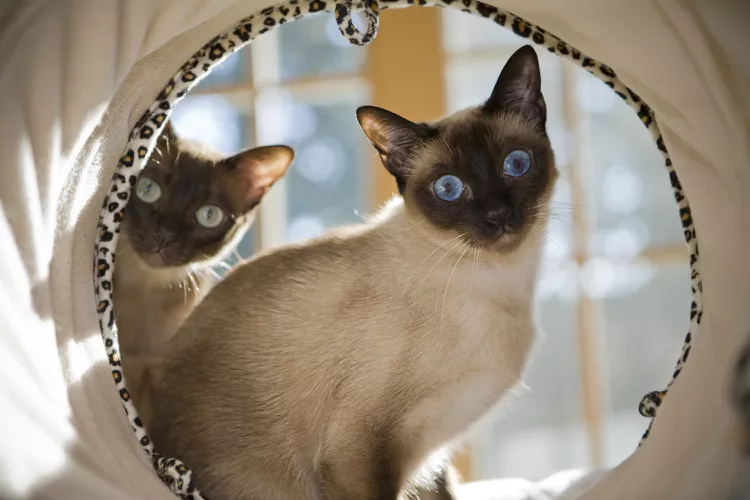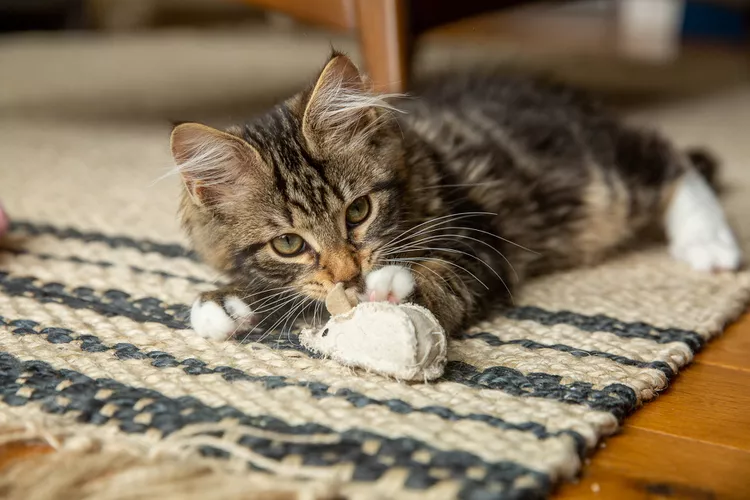
Thankfully, due to improvements in veterinary care and nutrition, our feline friends are living much longer than they used to. With our cats living longer, it is important to know the symptoms of common heath issues and when to see your veterinarian.
Many cats begin to encounter age-related physical and mental changes between seven and ten years of age and due to this, should see their veterinarian twice yearly for wellness exams and diagnostics. Bi-annual exams and diagnostics based on your veterinarian's recommendations are the best way to ensure your cat's health for various reasons including:
Below are some common changes you may note as your cat ages, which are a sign you should contact your veterinarian.
Your cat may be more withdrawn and even start hiding. Our cats are bonded to us and like to be engaged and present where we are. When your cat is suddenly not greeting you at the door, not sleeping with you, or not engaging in its normal activities, it may be a sign that something's wrong.
Another common behavior change that can be indicative of an underlying medical issue is a change in social interactions. A previously social cat may begin hissing anytime another pet in the house is around. A sick cat may avoid contact with the other animals or humans in the home, despite loving to sleep and interact with them in the past.
Cats can also uncharacteristically have episodes of aggression. A cat may begin to growl or hiss when people or other pets in the household approach it, may not be comfortable with being held, and may resent being brushed or combed. A painful cat may bite or scratch, especially if someone touches or moves the sensitive area or even if the cat anticipates that you may do it.
You may notice that your cat has less energy or decreased stamina to engage in previously enjoyable activities, such as playing with toys or chasing that red dot. Your cat may just lay on its side and paw at the wand toys verses chasing the toy. Your cat may be reluctant to jump, walk up or down stairs, have difficulty getting up from laying down, exhibit restlessness, or have difficulty finding a comfortable place to rest. You may also notice changes in sleeping patterns—the cat may sleep more or less, or may sleep in unusual positions and places. These can be symptoms of chronic pain or other medical issues.
Your formerly fastidious cat may begin missing the box occasionally or not using the box at all. Cats commonly will miss the litter boxes due to the pain associated with going in and out of the litter box, as well as difficulty squatting. Getting into a litter box and holding the squatting position can be very difficult for a cat with sore hips or knees. Other medical issues such as diabetes, inflammatory bowel disease, and kidney disease can cause cats to have increased frequency or urgency to use the the litter box, which can lead to accidents outside of the box.
Some conditions can cause a change in your cat's thirst or hunger. You may notice that you are filling your water bowls and fountains more often, or that your cat suddenly is a finicky eater or seems to be eating food constantly without gaining weight. If you notice any changes in your cat's eating and drinking habits, be sure to alert your veterinarian. This could be a sign of pain or various other serious medical issues including kidney disease, diabetes, and hyperthyroidism.
Some aging cats may seem lost or confused in a familiar environment. This can result in them becoming trapped in corners or behind furniture, vocalizing in the middle of the night, staring at walls or into space, or having difficulty finding their resources (food, water bowl, perch, or litter box).
These can be symptoms of cognitive dysfunction syndrome, which is a result of a decline in cognitive abilities as a result of aging changes in the brain. Cognitive functions include the mental processes of perception, awareness, learning, and memory, which allow an individual to acquire information about the environment and decide how to act. This is sometimes referred to as dementia, as in humans.
All of the above can be symptoms of a variety of illnesses and are often dismissed by cat caregivers as, “My cat is just getting older.” Changes in your cat's daily habits should not always be contributed to aging. Age is not a disease, but as your cat ages, it is more likely to be suffering from pain and other medical issues.

10 Obscure, Little-known Canine Facts in Honor of National Dog Day
With National Dog Day upon us, it's time to celebrate everything about our favorite pets—even the weirder stuff. Here are 10 obscure facts about dogs you probably didn't know.
Exploring the Different Types of Pet-Friendly Beaches
Are you looking for pet-friendly beaches? Learn about the different types of pet-friendly beaches, their locations, and tips for visiting them with your pet.
Toxic Chemicals & Household Items That Can Poison Dogs
There are many things in and around your home that can endanger your dog. Learn which chemicals and household items can poisin your dog.
Bronchitis in Dogs
Is your dog coughing and feeling unwell? It could be due to respiratory inflammation called bronchitis. Learn the causes, treatment, and prevention.
Choking in Dogs
A dog can occasionally swallow something incorrectly and start choking. Find out how you can tell if your dog is choking and what you can do about it.
Why Does My Dog Smell So Bad?
Does your dog smell? Find out what could be causing these unpleasant odors and if it's something that needs more than just a bath to fix.
Is Rosemary Safe for Dogs?
Rosemary is used both for cooking and as a supplement with many reported health benefits in people, so you may be wondering if it is safe to give to your dog. Rosemary is considered non-toxic for dogs but with some caveats.
Can Dogs Eat Blueberries?
Dogs can safely eat blueberries. Blueberries are packed with nutrients and can be a great addition to your dog's diet when fed in moderation. Learn more about the benefits, risks, how to incorporate blueberries into their diet, and other fruits dogs can eat.
Dog Food Basics
Are you feeding your dog the best way possible? Check out these dog feeding tips to keep your dog healthy and happy.
Swedish Vallhund: Dog Breed Characteristics & Care
The Swedish vallhund makes for a high-energy and affectionate companion. Learn about the breed's history, health, exercise needs, and more.
Becoming a Show Dog: Getting Started
Do you have the perfect puppy? Have you considered showing her in a dog show? There's much more to showing than showing up! Here's how to get started.
How to Care for a Hairless Cat
Hairless cats make great pets but they aren't without their own challenges and requirements. Read on to learn how to best care for your furless feline.
British Shorthair: Breed Profile, Characteristics & Care
The British Shorthair is a calm, affectionate cat that looks and feels like a plush teddy bear. Here's what you need to know about this popular breed, including appearance, temperament, health, and care.
Tonkinese: Cat Breed Profile, Characteristics & Care
The Tonkinese cat is a perfect mix of the Siamese and Burmese—smart, sociable, and sweet. Learn about the Tonkinese breed.
How to Stop Your Cat From Chewing Electrical Cords
Cats are known to pounce and attack inanimate objects, like electrical cords. Learn how to prevent your cat from ambushing objects that may harm it.
How to Stop Aggression in Kittens
Kittens may show aggressive behavior for several reasons. Sometimes their play gets too aggressive while other times the kitten is afraid or upset. Learn how to spot and curb aggression in kittens.
46 Egyptian Cat Names
Whether inspired by notable Egyptian deities, locales, or pharaohs, Egyptian cat names can bring out the divinity of your noble feline companion.
How to Tell If a Kitten is a Boy or a Girl
If you're wondering whether your new kitten is a boy or a girl, here are three ways to help determine the sex of your cat.
Signs Your Cat Is Aging and When to See the Vet
Expect some changes when your cat ages. Learn to differentiate between normal and potential medical problems for your elderly cat.
Coronavirus in Cats
Feline coronavirus (FCoV) rarely harms cats but can lead to another life-threatening illness. Learn the causes, treatment, and prevention.